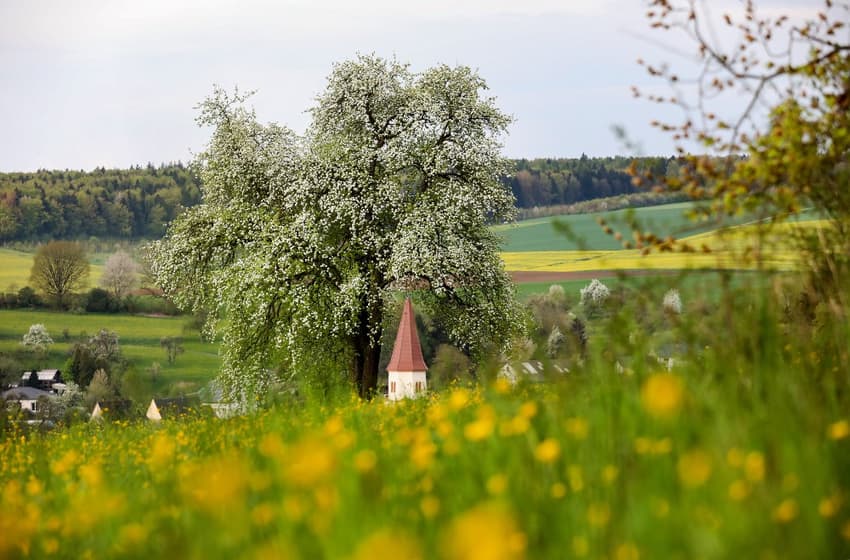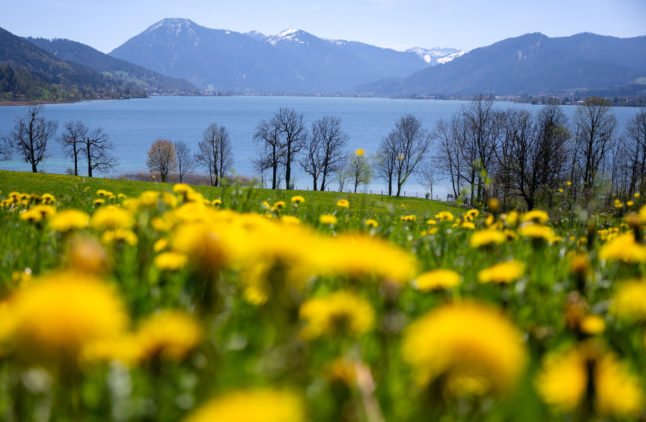Living in Germany: Countryside life, Maultaschen and the British royal family's German roots

From what it's like to live in small town Germany, to the surprising German roots of the British royal family, here are some of our top talking points this week.
What’s life like outside the big German cities?
Although many people from abroad settle in the bigger cities when they move to Germany, others choose a different style of life, opting for smaller towns. And with the affordable housing shortage getting worse lately in cities like Berlin, Munich and Hamburg, more people are considering if it’s worth their while to move to the countryside. The German government has also recently urged families to think about making the move outside of cities where there is more space.
We recently asked The Local readers what life is like in smaller towns across Germany, and they painted a positive picture. Many of the respondents to our survey said they had started off in a major city but had moved outside because of soaring rents and property costs. “I can afford much more space for the same money as in Berlin," said Ian, 59, who moved to the tiny hamlet of Picher in Mecklenburg Western-Pomerania.
Readers also flagged up community ties and being closer to nature as reasons for a move into rural life. "It's quieter, cleaner, greener, more affordable, safer, and child-friendly," said a respondent, who moved to the small Brandenburg town of Leegerbruch. But - as with everything - there are drawbacks. A lack of public transport connections and not as many cultural and nightlife options were a few of the negative points that came up.
Tweet of the week
The Maultaschen is a German delicacy that we love here at The Local. But just how do you describe it? We’ll let you be the judge.
For a decade I taught business English in companies all around Bavaria. If it was a slow lesson, I'd ask the class to describe Maultaschen in a single sentence.
Honestly, I'm sure there's former students of mine still arguing whether or not Maultaschen are "German Ravioli". pic.twitter.com/eAUbliPO9S
— Nic Houghton (@40PercentGerman) May 2, 2023
For a decade I taught business English in companies all around Bavaria. If it was a slow lesson, I'd ask the class to describe Maultaschen in a single sentence.
Honestly, I'm sure there's former students of mine still arguing whether or not Maultaschen are "German Ravioli". pic.twitter.com/eAUbliPO9S
— Nic Houghton (@40PercentGerman) May 2, 2023
Where is this?

Photo: DPA/ Sven Hoppe
Spring is a time when Germany really comes alive, and the colours start to pop. This photo captures dandelion blossoms in a meadow at Lake Tegernsee in Bavaria.
Did you know?
The coronation of Britain’s King Charles III took place over the weekend, but did you know that the British royal family has German roots? In fact, if it wasn’t for World War I, the British royal family would still go by a German name. The House of Saxe-Coburg and Gotha came from the marriage in 1840 of Queen Victoria to Albert, the descendant of a royal dynasty from Bavaria.
Nearly eight decades later, their grandson George V decided to disown the name while his country was fighting Germany in the Great War. As the royals dealt with increasingly hostile public opinion, the British king decided to cut ties with Germany and adopted the name of a famous castle and the royal residence, near London: the House of Windsor.
The first German to be crowned King of Great Britain was George I in 1714, who was born into the House of Hanover in northern Germany. He did not speak English, and his accession to the throne was due to his religion: Catholics were excluded from the line of succession, and he was the closest Protestant relative of the late Queen Anne. Queen Victoria was one of his descendants and after her marriage to Albert, the family changed its name from Hanover to Saxe-Coburg and Gotha. The pair regularly wrote to each other in German.
Comments
See Also
What’s life like outside the big German cities?
Although many people from abroad settle in the bigger cities when they move to Germany, others choose a different style of life, opting for smaller towns. And with the affordable housing shortage getting worse lately in cities like Berlin, Munich and Hamburg, more people are considering if it’s worth their while to move to the countryside. The German government has also recently urged families to think about making the move outside of cities where there is more space.
We recently asked The Local readers what life is like in smaller towns across Germany, and they painted a positive picture. Many of the respondents to our survey said they had started off in a major city but had moved outside because of soaring rents and property costs. “I can afford much more space for the same money as in Berlin," said Ian, 59, who moved to the tiny hamlet of Picher in Mecklenburg Western-Pomerania.
Readers also flagged up community ties and being closer to nature as reasons for a move into rural life. "It's quieter, cleaner, greener, more affordable, safer, and child-friendly," said a respondent, who moved to the small Brandenburg town of Leegerbruch. But - as with everything - there are drawbacks. A lack of public transport connections and not as many cultural and nightlife options were a few of the negative points that came up.
Tweet of the week
The Maultaschen is a German delicacy that we love here at The Local. But just how do you describe it? We’ll let you be the judge.
For a decade I taught business English in companies all around Bavaria. If it was a slow lesson, I'd ask the class to describe Maultaschen in a single sentence.
Honestly, I'm sure there's former students of mine still arguing whether or not Maultaschen are "German Ravioli". pic.twitter.com/eAUbliPO9S
For a decade I taught business English in companies all around Bavaria. If it was a slow lesson, I'd ask the class to describe Maultaschen in a single sentence.
— Nic Houghton (@40PercentGerman) May 2, 2023
Honestly, I'm sure there's former students of mine still arguing whether or not Maultaschen are "German Ravioli". pic.twitter.com/eAUbliPO9S
Where is this?

Photo: DPA/ Sven Hoppe
Spring is a time when Germany really comes alive, and the colours start to pop. This photo captures dandelion blossoms in a meadow at Lake Tegernsee in Bavaria.
Did you know?
The coronation of Britain’s King Charles III took place over the weekend, but did you know that the British royal family has German roots? In fact, if it wasn’t for World War I, the British royal family would still go by a German name. The House of Saxe-Coburg and Gotha came from the marriage in 1840 of Queen Victoria to Albert, the descendant of a royal dynasty from Bavaria.
Nearly eight decades later, their grandson George V decided to disown the name while his country was fighting Germany in the Great War. As the royals dealt with increasingly hostile public opinion, the British king decided to cut ties with Germany and adopted the name of a famous castle and the royal residence, near London: the House of Windsor.
The first German to be crowned King of Great Britain was George I in 1714, who was born into the House of Hanover in northern Germany. He did not speak English, and his accession to the throne was due to his religion: Catholics were excluded from the line of succession, and he was the closest Protestant relative of the late Queen Anne. Queen Victoria was one of his descendants and after her marriage to Albert, the family changed its name from Hanover to Saxe-Coburg and Gotha. The pair regularly wrote to each other in German.
Join the conversation in our comments section below. Share your own views and experience and if you have a question or suggestion for our journalists then email us at [email protected].
Please keep comments civil, constructive and on topic – and make sure to read our terms of use before getting involved.
Please log in here to leave a comment.